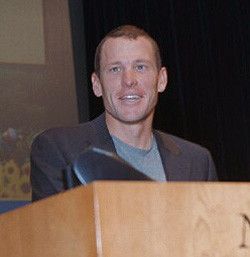Halo Effect
Zero Worship: Did Surviving Cancer Make Armstrong a Hero?
Why we so easily accord role-model status to survivors
Posted January 17, 2013
(Co-written with Lee Daniel Kravetz, writer and journalist)

Lance Armstrong
When Dutch marathon swimmer Maarten van der Weijden first slipped into the water as a kid, it was clear to everyone who clocked his pace that he was destined to be a professional swimmer. Indeed, Maarten was a champion by age 19.
But his promise was cut short when he was diagnosed with acute lymphoblastic leukemia and his medical team gave him a 30 percent chance of living.
Remarkably, after years of chemo and a stem cell transplant, these same doctors declared him cancer free. Even more remarkable, Maarten returned to swimming, and with considerable effort, performed even better than before. He ultimately made it to the 2008 Olympics and won a gold medal.
The Netherlands called him a national hero. Martin’s Olympic victory was only partly responsible for this status, however. He knew it was also because he was a cancer survivor. People started calling him an “inspiration” and a “role model,” among many other forms of praise. This led Maarten to famously tell a London Telegraph reporter to stop comparing him to Lance Armstrong.
It wasn’t that Maarten had the inside track on what we now know was Armstrong’s propensity for doping to win the Tour de France. His objection, rather, stemmed from hero worship.
It might be hard to remember after this week’s Oprah interview, but before Armstrong was driven from professional cycling and the Livestrong Foundation he founded, he was a hero to millions. Although many people weren’t all that surprised that he doped and lied, many others were and have responded with intense anger and sadness. The blogosphere, social media sites, and airwaves are filled with angry condemnations of Armstrong. One tweet reads, “Lance Armstrong. pathetic. liar, bully. sad role model for bike race enthusiasts.”
Clearly there’s some truth to that statement. Armstrong doped. Armstrong lied. And he made untold millions doing it. Our opinion is that there should be consequences for his wrongdoings.
But lots of people behave in equally unethical ways, and we don’t find ourselves getting nearly as upset about it. What was it about Armstrong? Why were we so willing to put him up on a pedestal? Why did he have so far to fall before hitting earth?
A good part of the answer may be his status as a cancer survivor. Armstrong’s story is nothing short of amazing: In 1996, after years of professional cycling, he was diagnosed with a testicular cancer that had already spread to his lungs and brain. The prognosis looked bad. But, after surgery (including an operation on his brain) and extensive chemotherapy, he recovered, rejoined the world of professional cycling in 1998, and won the Tour de France many times over.
When survivors experience amazing recoveries, we are often quick to label them “inspirations." And not just in an “it’s-amazing-you-survived” kind of way. Many of us are quick to assume they’re amazing and inspirational in other ways, as well.
In short, we assume they must also be good people. Psychologists have a term for this—the halo effect—and it was first documented by the great researcher Edward Thorndike in 1920.
The halo effect is a kind of cognitive bias in which our evaluation of someone’s character is unduly influenced by our overall impression of him or her. Most research on the phenomenon concerns physical appearance and has shown that the halo effect really matters. For instance, some studies have shown that jurors are more likely to assign more lenient sentences to attractive people than less attractive ones. Because people are beautiful or handsome, if we’re not careful, we may assume they’re also good people, deep down. We put them up on a pedestal.
We seem to do the same for survivors. Because someone’s survival story is inspirational, we jump to the unwarranted conclusion that he or she, as a person, must also be inspirational in other ways, even those not connected to his or her ordeal. So we tend to accord survivors role model status more broadly, even though we may have no real evidence they deserve it.
It’s important to note that this often is not an enjoyable experience for many survivors. Quite the contrary, it can place terrible pressure on them at precisely the time they may be trying to return to life as usual. Maarten van der Weijden strongly objected to being called an inspiration for surviving cancer. Cancer was something that happened to him, and he did what most would have done: fight for his life. He also just happened to be a fantastic athlete. When the Prime Minister of the Netherlands called him a hero for not only being a national champion, but one who survived cancer, Maarten knew he was in danger of falling into a kind of trap. Maarten was still the same person he was before cancer. Surviving didn’t make him superhuman or perfect in any way, even if others thought it did.
Armstrong, on the other hand, accepted this role model status. Far from rejecting the halo effect, he embraced it. Some people have called it narcissism while others have pointed out that this is simply how the game of professional sporting is played. There’s no denying that he did some good things with his fame, including having raised hundreds of millions of dollars for cancer research (reportedly $325 million from the sale of those yellow bracelets alone). But the temptation is to assume that he must be an angel--one with a halo.
As we now watch the Armstrong PR nightmare play out, we can see the danger in thinking that just because he survived he was, in every other way, untouchably special. Armstrong is human and flawed. Are we really that shocked?
For Maarten, not likely. “I noticed that being a hero was not a good atmosphere to accomplish something,” Marten told us. “When everyone tells you you’re so good, you can’t improve.” So promptly after winning his Olympic gold, he retired from professional swimming and did something else just as impressive as beating cancer.
He gave up fame to become a successful manager at Unilever, a large European food and toiletries company. “My hero status disappeared. I set my sight on a new goal—to be the best salesperson I could.”




